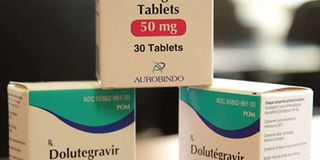WHO approves blockbuster HIV drug as safe for pregnant women

Antiretroviral drug dolutegravir
The World Health Organization (WHO) has announced that the ground-breaking antiretroviral drug dolutegravir, commonly known as DTG, is safe for use by pregnant women and those in their reproductive years.
Initial studies had highlighted a possible link between DTG and birth defects of the brain and spinal cord, which cause conditions like spina bifida in infants born to women who used the drug at the time of conception.
This safety concern arose from a May 2018 study in Botswana, which found four cases of such neural tube defects, out of 426 women who became pregnant while taking DTG.
Based on the findings, many countries paused their plans to make DTG-based regimens their preferred first-line therapy and advised pregnant women and those of childbearing age, to take an alternative antiviral medication called efavirenz (EFV).
The World Health Organization (WHO) then issued a note of caution about the use of DTG by women of childbearing age as part of its interim guidelines.
However, new expanded evidence-based data from two large clinical trials comparing the efficacy and safety of DTG and EFV in Africa, reveals that the risks of neural tube defects are significantly lower than initial studies had suggested.
The guidelines also considered mathematical models of the benefits and harms associated with the two drugs; the values and preferences of people living with HIV; factors related to implementing HIV programmes in different countries and cost.
“There is still a risk that we and countries need to monitor closely, but at this point, dolutegravir should be accessible for women of childbearing age due to the overwhelming benefits it offers,” Meg Doherty, Coordinator of Treatment and Care in the Department of HIV/Hepatitis and STIs at WHO said.
DTG is more effective, easier to take and has fewer side effects than alternatively prescribed drugs, according to the WHO. It also has a high genetic barrier to developing drug resistance, which is important given the rising trend of resistance to EFV and other regimens.
In 2019, 12 out of 18 countries reported pre-treatment drug resistance levels exceeding the recommended threshold of 10 per cent. These findings combined, informed the decision to update the 2019 guidelines.
Also, 82 low and middle-income countries reported that they would be transitioning to DTG-based HIV treatment regimens. The newly updated recommendations aim to help even more countries improve their HIV policies.
U.S. Global AIDS Coordinator and U.S Special Representative for Global Health Diplomacy, Ambassador Deborah L. Birx says that the President's Emergency Plan for AIDS Relief (PEPFAR) has committed to support countries in their continued transition to DTG.
“DTG offers many benefits, including that it is better tolerated by the patient, leads to improved outcomes, such as faster viral suppression, and often costs less. It is clear that transitioning to DTG will accelerate our progress toward controlling the HIV epidemic,” she said.



